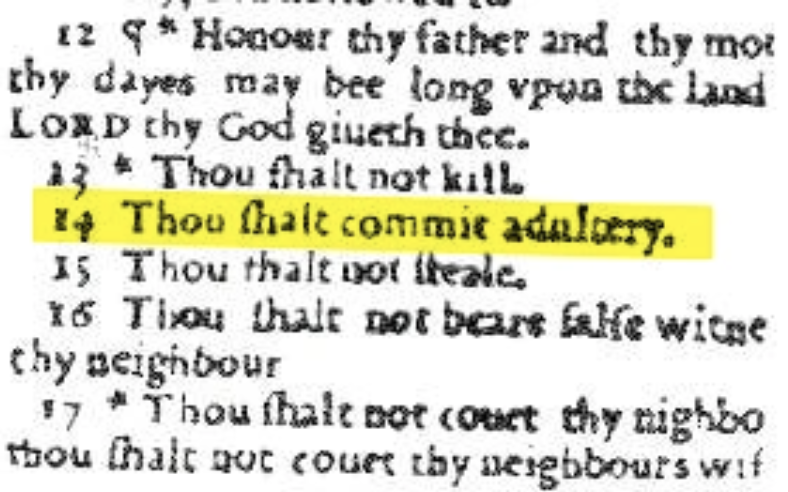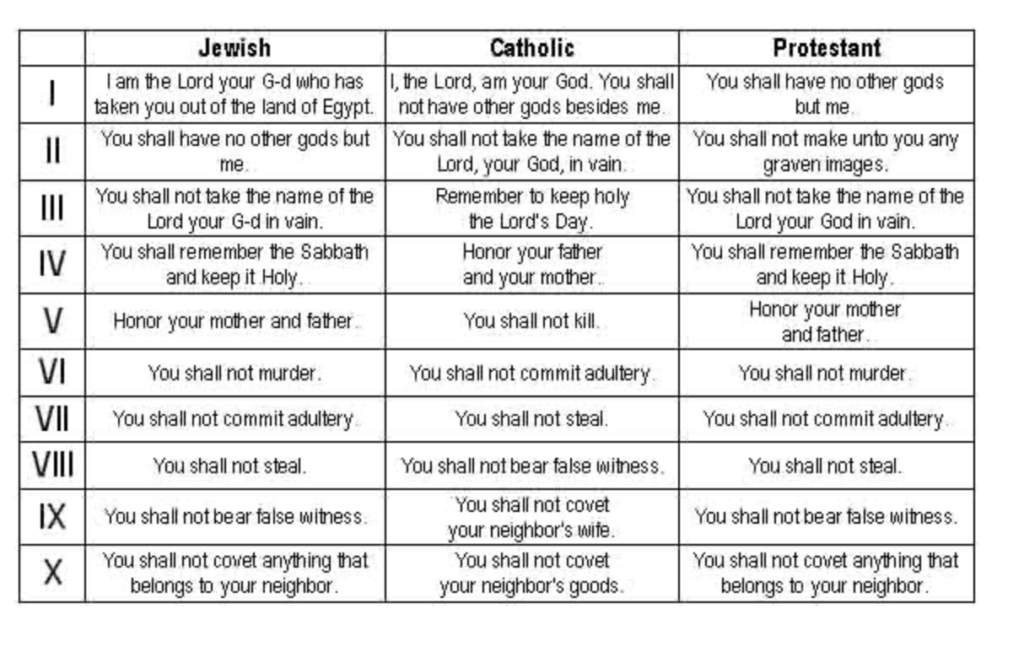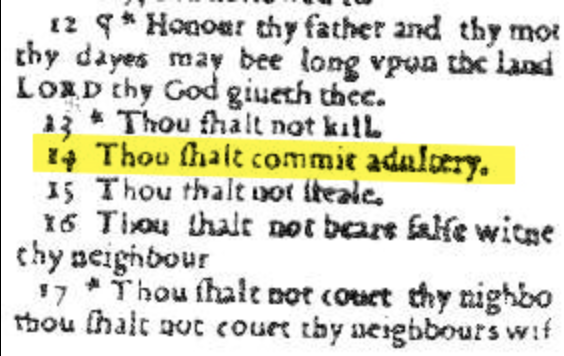
In Exodus and Deuteronomy we have what’s known as the Ten Commandments but they are not… So, they are the 10 what? No, they are called the Decalogue. Think of John’s Gospel and we have Jesus as the logos, the word of God, and so, the Decalogue is merely the 10 words, not commandments: one issue is that there are at least 613 commandments in the Hebrew Scripture, not just 10. Perhaps these were the first 10 in the original beta release of God’s software…on Moses’ tablets…
Here’s a quick recap of the Dekalogue:
Historically, these Decalogues were recorded in both Deuteronomy and Exodus, and they don’t quite fit together. A certain Bishop, back in the 5th C, called Augustus of Hippo, also configured them to help his understanding. He combined the first 2 and separated the last one into 2 separate ones. (https://www.bible-researcher.com/decalogue.html) And then the Jewish, Catholic and Protestant faiths all saw it that each of the words might be a little different in the overall layout.

Which one of these is the most important?
Moving on
The first four words provided the Israelites with guidance on their relationship with God. You know such as worship only God, make no idols or misuse God’s name, and observe the sabbath.

To some Jews it might be that can’t do any work on the Sabbath, from Friday sunset to Saturday sunset. That mean not being able to carry books, groceries, even children in those public places. So in places such as Manhatten, Dallas, Chicago, Atlanta etc, there are transparent cables erected across the city in a loop. These wires, at least 15 feet off the ground, inform Jews that within that public space, it is now considered a private space – just like home. So they can freely socialise on the Sabbath without breaking the Jewish Law. What do you think of that?
So what are they about?
Jesus summarised this in Matthew 22: 37 ‘You must love your God with all your heart, all your soul, and all your mind’. Be consistent in your faith.
The final six deal with boundaries for healthy human relationships. Oddly, if you were looking to offer guidance, you might want to couch them in a positive manner?
Well, the first one about honouring your parents is positive but it all goes a tadge negative after that: Do not murder, commit adultery, steal, testify falsely against your neighbour or covet anything belonging to your neighbour.
Jesus said “Love your neighbour as yourself”.
What might it mean back then?
Let’s briefly start back at the beginning: “I am the Lord your God who rescued you from the place of slavery”. God offers welcome form the outset before we even have made a move.
These directives are aimed at both men and women – even though men were the main speakers in that society then.
- Whereas other religions of the time had different gods such as Baal over the land, Yamm over the sea and Mot over the underworld, the Jews had YHWH, the God of all. If we started to have idols Israel then might start to limit how God works. Some faiths aren’t allowed any icons or material imagery: do we have idols today?
- If you misuse God’s name, then God will not you go unpunished. This is an odd statement, don’t you agree? I still can’t understand that one myself. What are your thoughts?
- There’s the Sabbath, which since 323AD and Emperor Constantine, although Matthew mentions the Lord’s Day for the day marked by the Resurrection, we now have the Sunday as our Sabbath – so how do we mark the Sabbath? Which day do we rest?
To kill or not to kill – that is the question
I recall trying to teach Do Not Kill during RE in school, as I had just left the RAF and Kuwait/Iraq. But in the Hebrew it doesn’t read Do not Kill, but do not murder, ratzach. So it means, the criminal acts of taking life.
How might you speak to someone who was ex-military, or … to Lucy Letby?
Wicked Bible of 1631
And then we have the ‘do not commit adultery, other than the Wicked Bible of 1631 where a typographic mistake, the omission of the word NOT, makes it interesting…

https://www.theatlantic.com/international/archive/2015/10/thou-shalt-commit-adultery/412222/
Many copies were burnt but some still exist today, and are worth of the order of £20k.
Ok so which do I do first?
So which are the most important ones? Are they in priority order?
What would happen if we took each commandment as equally as
“Thou Shall Not Murder”?
I found the dialogue interesting and I enjoyed